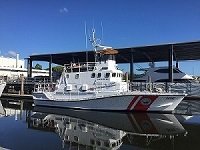markpierce
Master and Commander
- Joined
- Sep 25, 2010
- Messages
- 12,557
- Location
- USA
- Vessel Name
- Carquinez Coot
- Vessel Make
- penultimate Seahorse Marine Coot hull #6
One advantage to a bit more power than you need is that the motor isn't running all out when you hit your top speed. So lets say I need 300 hp to hit 14 knots and then I can't go faster, if instead I have a 350 hp motor running at 300 hp to 14 knots, in theory the motor should last longer. And at cruising speed, the revs on the larger motor are less than the revs on the smaller motor. ...
With my single NA 80-HP Deere, the engine is only working at 47% at one knot below hull speed (my normal cruising speed), and 72% at maximum boat speed. Besides, diesels like to be "worked."

 , but I'm thinking a minimum. From the posts here, it looks that around 10-14kn could be said to be a common minimum?
, but I'm thinking a minimum. From the posts here, it looks that around 10-14kn could be said to be a common minimum?
 , folowing the sea from dangers to boats all boat/ship.
, folowing the sea from dangers to boats all boat/ship.